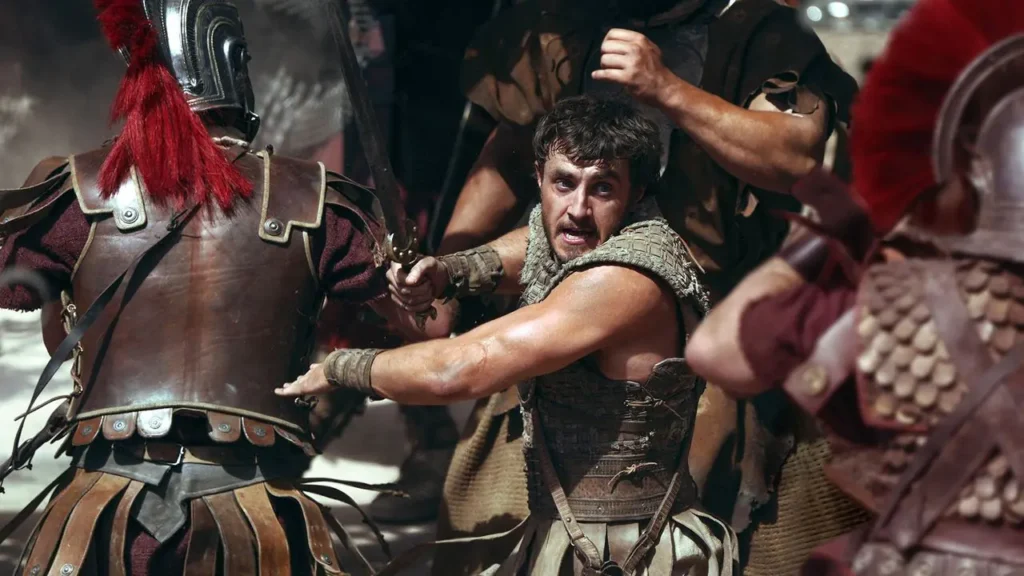GLADIATOR II: And That’s All for the Glory of Rome? [REVIEW]

A box office hit, a slew of Oscars, and—arguably the most valuable accolade—the title of a legendary film. “Gladiator” is undeniably a towering triumph of high-budget Hollywood, where breathtaking production scale is matched (and perhaps surpassed) by a sharp, unconventional script full of psychological depth and multifaceted characters across every level of the narrative. Its majestic soundtrack lifts spirits, and its many memorable quotes remain part of everyday lexicon. We lost the heroic Maximus, who with his final breaths took down Commodus. Rome was to become a republic, a dawn of hope signaling the end of terror, corruption, and decadence. Beautiful. All plotlines wrapped up more than satisfactorily. The sands of the Colosseum had absorbed enough blood. The story was over. Truly, we could feel the strength and honor.
But Ridley Scott didn’t entirely feel the same. For years, the British director worked on a sequel. Maximus’s fame and glory weren’t just to remain in the audience’s collective imagination but were to find representation within the cinematic universe itself. This time, Hanno (Paul Mescal) steps onto a path akin to Maximus’s. His city in North Africa is attacked and conquered by Roman forces. During the battle, his wife Arishat (Yuval Gonen) is killed, and Hanno blames General Marcus Acacius (Pedro Pascal) for her death. Once the city’s defender, Hanno becomes a prisoner of war, then a slave, and eventually a gladiator at a school run by Macrinus (Denzel Washington), whose ambitions extend far beyond profiting from the ten-day games just announced by the co-emperors, twin brothers Caracalla (Fred Hechinger) and Geta (Joseph Quinn).

“Gladiator II” is somewhere between a straightforward sequel and a legacy sequel, and it might even be considered a remake. What’s clear is that the film doesn’t quite stand on its own. It leans heavily on a similar narrative structure, journey, and motivations of its protagonist, once again placing him between earthly life and the call of Elysium. This is both a strength and a weakness. Fans and staunch critics of the first film alike will find something familiar in the sequel. Hanno’s dominant emotion is rage, but unfortunately, his defining feature is his striking physique. Paul Mescal, as the lead, comes across as bland and often absent. His aggression doesn’t feel well-constructed or psychologically convincing. History teaches us that epic tales thrive on commanding, leader-like characters. Hanno’s issue isn’t a lack of charisma (since that could be substituted with other compelling traits) but that he is regrettably nondescript.
To be honest, much of “Gladiator II” leaves the viewer feeling unpleasantly disoriented. There’s a lack of stakes, weak dramatic tension, and minimal sense of rivalry or progression towards any clear goal. The battles in the Colosseum, while visually spectacular, fail to escalate the narrative conflicts or strengthen alliances among the characters. Instead, they are treated as side attractions, with curiosities like fights against strange monkeys or a naval battle involving sharks. The “wow” factor comes more from elaborate set pieces and intriguing camera work, which the filmmakers compensate for with CGI shortcuts. Sadly, this approach doesn’t create myths.

Above the lackluster Mescal, the caricatured emperors, and the subdued Pascal, Denzel Washington shines. His Macrinus commands attention: cunning, duplicitous, capable of both eloquent lies and blunt truths. He is a magnetic presence, adding spice to every brief dialogue and infusing weight into every word and gesture in longer monologues. If there’s anywhere to shout a triumphant “Bravo!” it’s not during the bloody executions, majestic panoramas, or the opening battle with hundreds of extras, but at Macrinus’s ambiguous smile. The dream of a just and virtuous Rome, of Rome as a republic and a beacon of light, is still whispered. Whispered so softly that no one believes it might be possible. For “Gladiator II”, the myth worth whispering about isn’t some idealistic political vision—it’s the unattainable legacy of its predecessor. Everything else may be dust and air.

